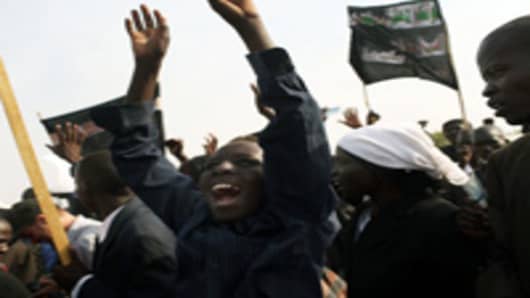The US wants China and Arab states to help foot the $3 billion bill for a deal designed to unlock oil production and set Sudan and South Sudan back on the path to peace.
The warring neighbors reached agreement on Saturday on how much South Sudan should pay to export its oil via pipelines in Sudan, resolving a crucial part of a dispute that sparked fresh fighting and led the south to shut down crude production in January.
South Sudan will pay fees equivalent to $9.48 per barrel of oil for the use of export infrastructure in Sudan. It has also agreed to transfer $3.028 billion to Khartoum to plug part of the financing gap resulting from its secession from the north last year after decades of civil war.
But this leaves Khartoum short of another $3 billion — over three and a half years — that it is seeking in compensation for the loss of revenues from the oil-rich south.
The US is unable to fund that because of the sanctions it applies to Khartoum. But mediators and diplomats told the Financial Times that Washington planned to encourage other donors to step in, and would waive sanctions affecting dollar transfers.
“There are two things Khartoum is looking for out of the oil deal: a concerted effort by the international community to get them [the $3 billion] — much from Arab countries and China, and they would also like sanctions lifted,” a senior western diplomat told the FT.
The US pledged — as part of an original peace agreement between north and southern Sudan in 2005 — to lift sanctions if Khartoum allowed a referendum on the independence of the south to go ahead. But the Khartoum regime has been accused of war crimes since. The diplomat said that Washington would not be in a position to lift sanctions until there was progress in resolving the separate conflicts in Darfur and elsewhere.
“They have to understand that they and South Sudan and the AU and others will go around the world urging friends of Sudan to do this. The US would be all for it but it can’t do it because it has too many sanctions,” the diplomat said.
An official from the African Union, which helped mediate Saturday’s agreement through its envoy Thabo Mbeki, the former South African president, said Khartoum insisted the US do its part by encouraging other states to contribute.
“The US has some leverage on this because most financial transactions are in dollars and subject to sanctions. If the US doesn’t grant waivers it can make life difficult for the Kuwaitis and Qataris,” he said of two of Khartoum’s main Arab allies.
Chinese and other oil companies have agreed to pay part of the oil transit fees. Further funds would also be solicited from Beijing, he said.
“It is a typical Sudanese formula. They fix the money part while the hard political issues get batted down the road,” the official said, alluding to delicate negotiations over disputed border territories and proxy militias still to come.
The economies of both North and South Sudan are dependent on oil. But despite the disastrous impact of the oil shutdown, both capitals are insisting that a security deal over borderlands, disputed territories and proxy militias must be hammered out before petrodollars flow again.
“The whole thing hinges on a security agreement,” Sabir Hassan, chief economic negotiator for Sudan, told the FT. Pagan Amum, lead negotiator for the South, said that the oil agreement is to be “part of a comprehensive deal on [the disputed territory] Abyei, security and citizenship … and then the oil will flow.”


